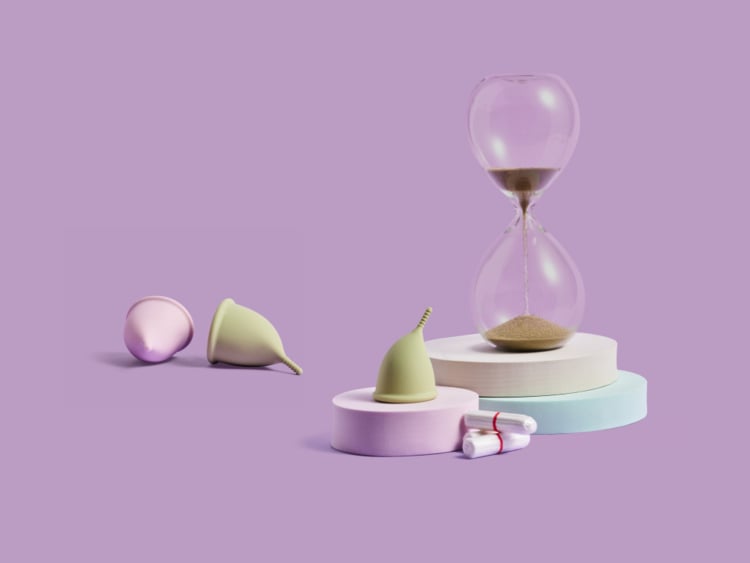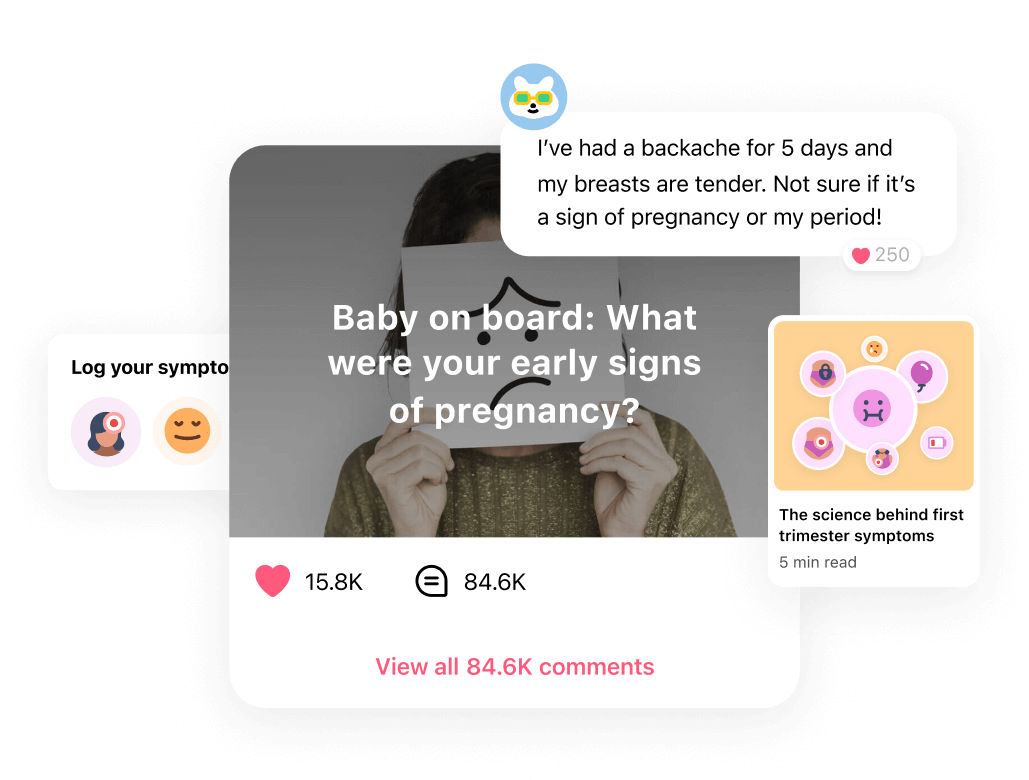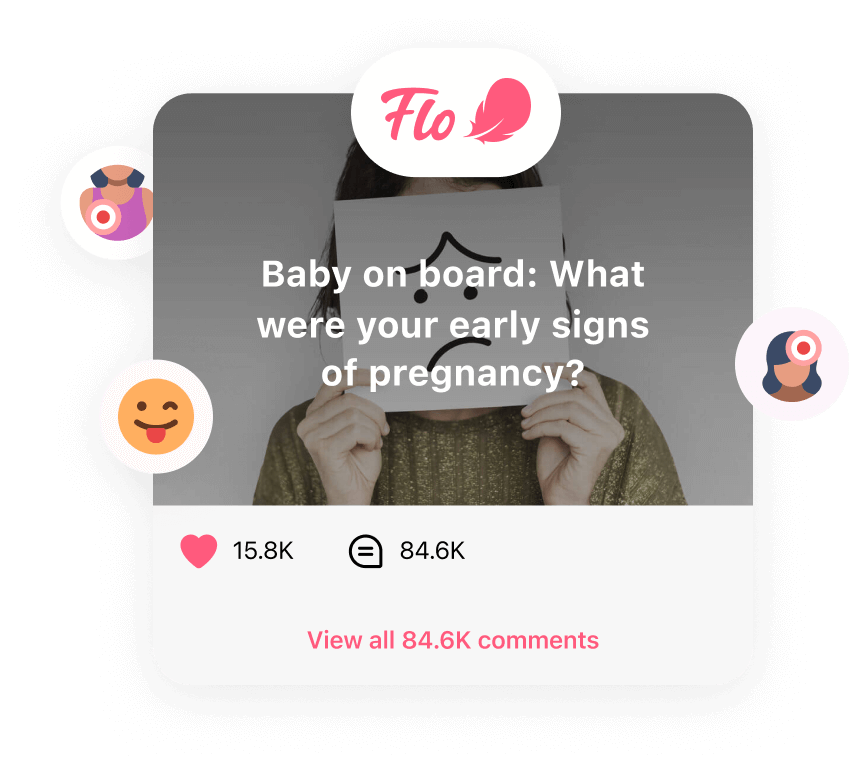Common as they may be, experiencing a late period can be stressful. Find out some of the possible reasons behind your late cycle.
-
Tracking cycle
-
Getting pregnant
-
Pregnancy
-
Help Center
-
Flo for Partners
-
Anonymous Mode
-
Flo app reviews
-
Flo Premium New
-
Secret Chats New
-
Symptom Checker New
-
Your cycle
-
Health 360°
-
Getting pregnant
-
Pregnancy
-
Being a mom
-
LGBTQ+
-
Quizzes
-
Ovulation calculator
-
hCG calculator
-
Pregnancy test calculator
-
Menstrual cycle calculator
-
Period calculator
-
Implantation calculator
-
Pregnancy weeks to months calculator
-
Pregnancy due date calculator
-
IVF and FET due date calculator
-
Due date calculator by ultrasound
-
Medical Affairs
-
Science & Research
-
Pass It On Project New
-
Privacy Portal
-
Press Center
-
Flo Accuracy
-
Careers
-
Contact Us
How late can a period be before pregnancy becomes an option?


Every piece of content at Flo Health adheres to the highest editorial standards for language, style, and medical accuracy. To learn what we do to deliver the best health and lifestyle insights to you, check out our content review principles.
When your period is late, it’s natural to question whether you could be pregnant. But the likelihood of pregnancy will depend on all kinds of factors, from how many days late your period is to lifestyle changes that could be impacting your cycle.
Key takeaways
- Your period is considered late if it’s more than eight days overdue and your cycle is normally regular and monthly.
- You can miss your period, not be pregnant, and not have a condition. It can be due to stress, changes in your diet or exercise, weight changes, or medications.
- If you think you might be pregnant, take a pregnancy test on the day of your expected period or a few days after.
- Reach out to your doctor if you get a positive result, and if you get a negative result, you can retake the test in a couple of days. If it’s still negative and your period hasn’t arrived, then contact your doctor.
How many days late can a period be before pregnancy is a possibility?
You might be wondering how late a period can be before pregnancy becomes a possibility. Before we go on, let’s do a quick refresher on what exactly a period is. The first day of your period marks the first day of your menstrual cycle, which will continue until your next period. During your menstrual cycle, one of your ovaries will release an egg (a process called ovulation). If it is fertilized by a sperm, and implants into the lining of your uterus, this will mean you’re pregnant. However, if the egg is not fertilized, the lining of the uterus will shed through the vagina in the bleeding you know as your period.
So maybe your period is already three or four days late, or maybe you have irregular periods and you’re not sure exactly how late you are. Well, rest assured that the menstrual cycle isn’t the same for everyone. Healthy cycles can range in length from 21 to 35 days. Plus, how long a cycle lasts can vary from cycle to cycle.

 Over
7.8M
ratings averaging
4.8/5
*
Over
7.8M
ratings averaging
4.8/5
*
Understand your body’s signals with the Flo app
- Chat with others who are trying to get pregnant.
- Get trusted information on signs of pregnancy from 100+ medical experts.
- Log your symptoms and learn what they could be trying to tell you.
 Over
7.8M
ratings averaging
4.8/5
*
Over
7.8M
ratings averaging
4.8/5
*

Trying to conceive?
The Flo app can help you through the two-week wait.

 Over
7.8M
ratings averaging
4.8/5
*
Over
7.8M
ratings averaging
4.8/5
*
Understand your body’s signals with the Flo app
- Chat with others who are trying to get pregnant.
- Get trusted information on signs of pregnancy from 100+ medical experts.
- Log your symptoms and learn what they could be trying to tell you.
How do you know if your period is late?
Whether you’re busy or just have a lot on your mind, it’s easy to forget when you should expect your period to start. But if you’re not sure when to expect your period, it’s hard to know if it’s late.
A period tracking app like Flo can help. By logging your usual menstrual cycle dates, Flo can predict when you can expect your period — clever, huh? This information can also be very useful if you need to go to your health care provider when you miss your period. Having information about your cycle can help them understand what’s happening inside your body.
So, when is your period considered late enough to warrant questioning? Your period is considered late — and worth investigating, either with a pregnancy test or a visit to your doctor — if it’s been more than seven days since you expected it to arrive.
Is it normal for your period to be late sometimes?
Are you looking for some reassurance about a slightly late period? It’s actually normal for the length of your cycle to vary by a day or two each month. In fact, your period would only be considered irregular if it arrives more than seven to nine days later than you expected it. This means that a 30-day cycle one month followed by a 34-day cycle the next is likely nothing to worry about.
Take a quiz
Find out what you can do with our Health Assistant
Reasons for a late period (other than pregnancy)
Do you have a late period but a negative pregnancy test? First of all, don’t panic — you’re not the first, and you certainly won’t be the last. There are lots of causes for a late period that aren’t pregnancy.
Remember that if you have a missed period and you’re concerned or have any questions, you should always reach out to your health care provider. With that in mind, let’s take a look at some of the most common causes of late periods.
Hormonal birth control
One of the ways that hormonal birth control prevents pregnancy is by thinning the uterine lining. This lining, or endometrium, is where an embryo would implant itself if you got pregnant. It’s also the layer that sheds from your uterus during your period each month. Since birth control makes this layer thinner, many people experience lighter bleeding while they’re taking it.
In some cases, the endometrium gets so thin that menstruation doesn’t happen. Everyone is different, and as long as you’ve been taking your birth control correctly, missing a period on birth control shouldn’t be a cause for concern. If it will ease your mind, you can always take a pregnancy test if you’re not sure. And don’t forget that you can always reach out to your doctor for advice.
Stress
There are many causes of stress, and it can affect everyone differently. When you experience chronic or extreme stress, hormones like cortisol can interfere with your menstrual cycle. However, it’s hard to determine exactly how much stress or what kind of stress you have to experience for this to occur since everyone reacts to stress differently.
Creating healthy lifestyle habits can help keep both your mind and body in good shape, reducing the risk of irregular periods.

Weight fluctuations
Weight fluctuations could be another reason for a missed period and a negative pregnancy test. For example, adopting an extreme calorie- or food group-restricted diet and doing excessive exercise could cause your weight to drop, which could temporarily halt your periods. This is because both of these things cause energy deprivation, and in response, your body may stop ovulating (releasing an egg) to conserve energy. This can be scary to experience, but rest assured that this effect is reversible. Reach out to your health care provider, and they can give you some advice on how to adjust your lifestyle accordingly.
Medications
Certain medications, such as antipsychotics, can create hormonal imbalances that can cause a late or missed period. Check with your health care provider or pharmacist about the possible side effects of any medications you’re taking.
Breastfeeding
Strange but true: the hormone that causes your body to produce breast milk can also stop it from producing the hormones that control your periods. So if you’re breastfeeding at the moment, this could be why your period has gone AWOL.
However, it’s worth noting that this tends to happen for women who are fully breastfeeding their babies, including through the night. If you are doing a combination of bottle-feeding and breastfeeding, your period could start around five to six weeks after you’ve given birth. This means that you could also become pregnant again, so be sure to use birth control if you’re not planning for another child right away.
In any case, remember that if you’ve just had a baby, it is normal for your period to be late — after all, your body has just been through a huge amount of change!
Change in sleep schedule
Has your sleep schedule been disrupted lately? This could also be the reason behind your late period. In fact, one study found that sleeping for shorter periods of time could increase the chances of period irregularities by 44%, although more research is needed. If you’re struggling to sleep at the moment, know that insomnia usually gets better after adopting good sleeping habits, like making sure your bedroom is dark and quiet and going to bed and waking up at the same time every day. It can also be reassuring to know that insomnia is very common, affecting one in three people worldwide — so you’re in good company.
Polycystic ovary syndrome
Polycystic ovary syndrome (PCOS) is a condition that can cause irregular periods because it affects your ovulation. Other symptoms of PCOS include:
- Excessive body hair growth (hirsutism)
- Thinning hair
- Weight gain
- Difficulty losing weight
- Acne on the face, chest, and upper back
- Difficulty getting pregnant
- Darkening of skin, particularly along neck creases, in the groin, and underneath breasts
- Period symptoms but no period
If you believe that you could have PCOS, a health care provider can give you a proper diagnosis, answer any questions you may have, and prescribe the treatment that you need.
Other conditions
There are a number of other conditions that can also cause late or missed periods. These conditions include:
- Perimenopause is the transition before menopause when you may experience some menopause-like symptoms.
- Thyroid disease means you have an underactive or overactive thyroid gland that can cause your periods to stop.
- Pituitary tumors are noncancerous tumors on your pituitary gland that can interfere with your hormones.
- Diabetes.
So whether your period is two days late, three days late, or even a whole seven days late, it doesn’t always mean that you’re pregnant. In some cases, such as when you’re experiencing stress, your cycles could return to normal once you’ve taken steps to manage the stress. However, if you’re worried about the underlying cause of your late period, it’s always helpful to take a pregnancy test (to either confirm or exclude pregnancy as the cause) and/or contact your health care provider if other symptoms arise.
What should you do if your period is late?
As we explored above, how many days late a period can be before worrying about pregnancy depends on what’s normal for you and your cycle. However, a period that’s overdue by eight days could be considered late.
If you’re sexually active and suspect you may be pregnant, it’s a good idea to take a pregnancy test on the day of your expected period or a few days after that for the most accurate result. If you get a negative pregnancy test result, still haven’t gotten your period, and start to experience early pregnancy symptoms, it might be worth considering taking another test. Sometimes, a home pregnancy test can give a false negative pregnancy test result if it’s taken too early in the pregnancy to detect human chorionic gonadotropin (the hormone your body only produces when you’re pregnant) in your urine. If you think you may have taken the test too early, take it again in a few days to a week’s time to know if you’re pregnant after a late period. Our pregnancy test calculator can help you determine when the test will be most accurate.
When should I see a doctor?
If you get a negative pregnancy test and your period is delayed by more than seven days with no pregnancy symptoms, you may want to see your health care provider to figure out what’s going on. You should definitely speak to your doctor if you’ve missed three periods in a row and have had a negative pregnancy test. It can also be helpful to take a log of your periods from the past couple of months with you to your appointment.
FAQs
By how long can stress delay your period?
Chronic or major stress can certainly delay your period. Ultimately, the maximum time stress can delay your period is different for everyone — it all depends on how your own unique brain and body respond to stress.
How can you encourage your period to come?
There’s nothing you can do to make your period start. However, you can reduce your risk of having stress-related irregular periods through self-care practices, like practicing stress reduction techniques, maintaining a healthy lifestyle, not drastically limiting your calorie intake, and making sure you get enough rest.
Can caffeine delay your period?
Good news for coffee lovers: it’s unlikely that caffeine can delay your period. Research shows that there is not a strong association between consuming caffeine and experiencing a long menstrual cycle.
What color is pregnancy discharge?
Typically, vaginal discharge is white or clear, and you may produce more of it than normal during pregnancy. Vaginal discharge during pregnancy can also be brown or red if you experience implantation bleeding. This discharge usually happens around 10 to 14 days after conception, is light, and will stop on its own. See a doctor if you have any concerns.


Hey, I'm Anique
I started using Flo app to track my period and ovulation because we wanted to have a baby.


The Flo app helped me learn about my body and spot ovulation signs during our conception journey.


I vividly
remember the day
that we switched
Flo into
Pregnancy Mode — it was
such a special
moment.
Real stories, real results
Learn how the Flo app became an amazing cheerleader for us on our conception journey.
References
“Abnormal Uterine Bleeding.” The American College of Obstetricians and Gynecologists, Dec. 2021, www.acog.org/womens-health/faqs/abnormal-uterine-bleeding.
“Amenorrhea.” Mayo Clinic, 9 Feb. 2023, www.mayoclinic.org/diseases-conditions/amenorrhea/symptoms-causes/syc-20369299.
“Am I Pregnant?” Cleveland Clinic, my.clevelandclinic.org/health/articles/9709-pregnancy-am-i-pregnant. Accessed 25 Aug. 2023.
“Birth Control Pills.” Cleveland Clinic, my.clevelandclinic.org/health/drugs/3977-birth-control-the-pill. Accessed 25 Aug. 2023.
Evans, Milly. “Why You Should Be Tracking Your Period.” Patient, 30 Sep. 2020, patient.info/news-and-features/why-you-should-be-keeping-a-period-symptoms-diary.
Fenster, L., et al. “Caffeine Consumption and Menstrual Function.” American Journal of Epidemiology, vol. 149, no. 6, Mar. 1999, pp. 550–57, doi:10.1093/oxfordjournals.aje.a009851.
“Fertilization and Implantation.” Mayo Clinic, www.mayoclinic.org/healthy-lifestyle/pregnancy-week-by-week/multimedia/fertilization-and-implantation/img-20008656. Accessed 25 Aug. 2023.
“Heavy and Abnormal Periods.” The American College of Obstetricians and Gynecologists, Oct. 2020, www.acog.org/womens-health/faqs/heavy-and-abnormal-periods.
“8 Reasons Why Your Period Is Late.” Cleveland Clinic, 20 Apr. 2023, health.clevelandclinic.org/why-is-my-period-late/.
“Home Pregnancy Tests: Can You Trust the Results?” Mayo Clinic, 23 Dec. 2022, www.mayoclinic.org/healthy-lifestyle/getting-pregnant/in-depth/home-pregnancy-tests/art-20047940.
“How Stress Can Affect Your Menstrual Cycle.” UT Physicians, 2 Aug. 2022, www.utphysicians.com/how-stress-can-affect-your-menstrual-cycle.
“Is Implantation Bleeding Common in Early Pregnancy?” Mayo Clinic, 19 Apr. 2022, www.mayoclinic.org/healthy-lifestyle/pregnancy-week-by-week/expert-answers/implantation-bleeding/faq-20058257.
“Insomnia.” Cleveland Clinic, my.clevelandclinic.org/health/diseases/12119-insomnia. Accessed 25 Aug. 2023.
“Insomnia.” NHS, www.nhs.uk/conditions/insomnia/. Accessed 25 Aug. 2023.
“Irregular Periods.” Cleveland Clinic, my.clevelandclinic.org/health/diseases/14633-abnormal-menstruation-periods. Accessed 25 Aug. 2023.
Kennedy, Kathryn E. R., et al. “Menstrual Regularity and Bleeding Is Associated with Sleep Duration, Sleep Quality and Fatigue in a Community Sample.” Journal of Sleep Research, vol. 31, no. 1, Feb. 2022, p. E13434, doi:10.1111/jsr.13434.
“Can Stress Cause You to Skip a Period?” Cleveland Clinic, 18 Sep. 2020, health.clevelandclinic.org/can-stress-cause-you-to-skip-a-period/
“Menstrual Cycle: What’s Normal, What’s Not.” Mayo Clinic, 22 Apr. 2023, www.mayoclinic.org/healthy-lifestyle/womens-health/in-depth/menstrual-cycle/art-20047186.
“Menstrual Period, Late or Missed.” Tufts Medical Center Community Care, hhma.org/healthadvisor/pa-menstrua-pep/. Accessed 25 Aug. 2023.
“Missed or Late Periods.” NHS, www.nhs.uk/conditions/missed-or-late-periods/. Accessed 25 Aug. 2023.
“Polycystic Ovary Syndrome (PCOS).” Cleveland Clinic, my.clevelandclinic.org/health/diseases/8316-polycystic-ovary-syndrome-pcos. Accessed 25 Aug. 2023.
“Perimenopause.” Cleveland Clinic, my.clevelandclinic.org/health/diseases/21608-perimenopause. Accessed 25 Aug. 2023.
Pinkerton, Joann V. “Absence of Menstrual Periods.” MSD Manual Consumer Version, Feb. 2023, www.msdmanuals.com/en-gb/home/women-s-health-issues/menstrual-disorders-and-abnormal-vaginal-bleeding/absence-of-menstrual-periods.
“Pituitary Tumors.” Mayo Clinic, 29 Nov. 2022, www.mayoclinic.org/diseases-conditions/pituitary-tumors/symptoms-causes/syc-20350548.
“Polycystic Ovary Syndrome.” NHS, www.nhs.uk/conditions/polycystic-ovary-syndrome-pcos/. Accessed 25 Aug. 2023.
“Vaginal Discharge.” Cleveland Clinic, my.clevelandclinic.org/health/symptoms/4719-vaginal-discharge. Accessed 25 Aug. 2023.
“When Will My Periods Start Again after Pregnancy?” NHS, www.nhs.uk/common-health-questions/pregnancy/when-will-my-periods-start-again-after-pregnancy/. Accessed 25 Aug. 2023.
Wright, Kristen Page, and Julia V. Johnson. “Evaluation of Extended and Continuous Use Oral Contraceptives.” Therapeutics and Clinical Risk Management, vol. 4, no. 5, Oct. 2008, pp. 905–11, doi:10.2147/tcrm.s2143.
History of updates
Current version (08 September 2023)
Published (07 March 2019)
In this article

Get your personal guide to fertility
-
Learn how to read your body's ovulation signals
-
Find daily conception tips from our experts
-
Chat with others who are trying to get pregnant




